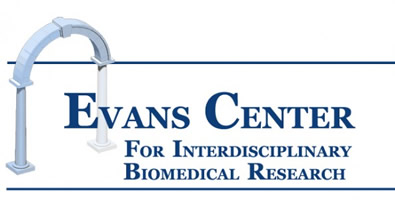2014 A Productive Year for OCRI ARC

2014 was a hugely productive year for the OCRI’s Etiology and Pathogenesis of Oral Cancer (EPOC) Affinity Research Collaborative (ARC). We are pleased to report that renewed funding has been granted by the Evans Center for Interdisciplinary Biomedical Research for 2015. The EPOC ARC consists of a number of OCRI investigators who work collaboratively on multidisciplinary projects with the overarching goal of deciphering the molecular mechanisms underlying oral cancer development and progression to metastasis, and identifying novel druggable targets for effective and lasting oral cancer therapies. Over the course of 2014, the EPOC ARC has effectively utilized both internal and external resources, and has developed new collaborations in order to accomplish its scientific objectives.
OCRI investigators use many important resources on the Boston University Medical Campus. The nature of the biomedical research conducted by the EPOC ARC necessitates access to human premalignant and oral squamous cell carcinoma (OSCC) specimens. In order to gain access to these staged oral tissues, OCRI investigators have been working closely with the Henry M. Goldman School of Dental Medicine’s Center for Oral Diseases. Directed by Dr. Andrew Salama, the clinical center focuses on patient care as well as the study and treatment of oral disease. The Flow Cytometry Core Facility, directed by Dr. Jennifer Snyder-Cappione, also aids EPOC ARC researchers by conducting cell sorting analyses on oral tissue samples.
On the Charles River Campus, OCRI has partnered with two leading researchers. Director of the Center for Nanoscience & Nanotechnology Dr. Mark Grinstaff, is collaborating on developing exciting novel nano-delivery approaches for DPAGT1/Wnt/YAP-TAZ pathway inhibitors. Professor in Biomedical Engineering Dr. Christopher Chen is working to establish new 3D culture systems to study epithelial stromal interactions in oral cancer.
Additionally, 2014 has yielded collaborations with external institutions, such as the Forsyth Institute in Cambridge. Forsyth is considered the world’s leading independent research institute dedicated to oral health research. OCRI has partnered with Chief Executive Officer of Forsyth Dr. Philip Stashenko and his colleagues to conduct a functional analysis on the oral microbiome-host interaction in OSCC. This collaboration will help investigators further expand the scope of their work by gaining access to Forsyth’s extensive resources and expertise.
Since the establishment of the EPOC ARC, OCRI investigators have had their findings published in 11 high impact scientific journals, with additional submissions still in review. Investigators and trainees have also gone on to present their work as either oral or poster presentations at over 15 different national and international scientific conferences. This work has also contributed to several grant applications including a multi-PI U01 application on Targeting Co-dependent Molecular Pathways in Oral Cancer.
In the fall, the EPOC ARC hosted its first annual symposium, showcasing the outstanding work being conducted by pre- and post-doctoral trainees associated with the ARC. The EPOC ARC symposium took place on September 21st and consisted of eight presentations by trainees and a keynote address on the molecular pathogenesis of oral cancer by Dana-Farber Cancer Institute and OCRI Executive Committee member Dr. Peter Hammerman. The high caliber of the science presented at the symposium is evidence of the important educational role the EPOC ARC plays at Boston University.
Much has been accomplished over the course of this year, and the EPOC projects have great potential for further development and expansion. With renewed support from the Evans Center, the EPOC ARC will continue to make strides in supporting the mission of the OCRI, which is to translate research findings into diagnosis, prevention, and a cure for oral cancer.